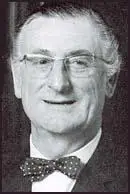Bob Wall

Robert (Bob) Wall, the son of a plumping superintendent employed by the Metropolitan Water Board, was born in 1912. He attended Highbury Park School where he captained the football and cricket teams. After leaving school he attended the commercial college at Finsbury Park.
Wall was a keen supporter of Arsenal and every other Saturday afternoon he cheered on his heroes: Charlie Buchan, Billy Blyth and Alf Baker.
In February 1928, Wall applied for a job as a clerical worker at Highbury Stadium. Although only sixteen years old, Wall got the job. As Wall later explained: "I worked from 8.30 a.m. to 6.30 or 7 at night. My duties were handling Chapman's correspondence and also learning the work of the box-office under the assistant-manager, Joe Shaw."
Herbert Chapman was a hard taskmaster: "My official starting time in the morning was nine o'clock but Mr. Chapman expected his correspondence to be opened and ready for him when he walked into his office at nine. If it wasn't there, he wanted to know why. So, for my self-protection, I always reported 30 minutes early. No member of the staff was permitted to leave the building unless he had telephoned Chapman's office at six o'clock and enquired: 'Is it all right for me to go now, Mr. Chapman?' We all had a real respect for him. I suppose too, there was a tinge or more of fear in our approach to him."
In October, 1928, Herbert Chapman, took Wall with him to the Euston Hotel where he negotiated the transfer deal with Bolton Wanderers that brought David Jack to Arsenal. Chapman paid a record transfer fee of £10,890 for Jack. Chapman later told Wall that the buying of Jack was "one of the best bargains I ever made".
Wall eventually became Chapman's assistant and was always at his side. Chapman's team-talk took place on Friday morning. Wall remarked that he always told players: "Never mind what the other team does - this is what you are going to do." Chapman had a magnetic table marked out as a football field, with little toy players that could be moved around on it. Every player was encouraged to give his own views on the game taking place the following day. By the end of the meeting every player was fully aware of the role they were to play in the match.
Bob Wall wrote in his autobiography, Arsenal from the Heart: "Chapman thought deeply about an infinite variety of subjects associated with the game. He possessed the gift of seeing ahead of his time. He was able to visualize how soccer could benefit from adopting ideas which, in their infancy, seemed to most other people to be merely the outpourings of an eccentric mind."
When Herbert Chapman died, George Allison put Wall in charge of the box-office. Wall claimed that "Allison was a complete contrast to Chapman... He never claimed to possess a deep theoretical knowledge of the game but he listened closely to what people like Tom Whittaker and Alex James had to say. Like Chapman before him, Allison always insisted that, no matter how good a prospective signing might be, he would secure him only if his character was beyond reproach."
George Allison resigned in 1947 and Tom Whittaker agreed to become manager of the club. When Whittaker died in October 1956, it was decided to end the policy of employing a secretary-manager. Jack Crayston was appointed manager and Wall became the club secretary.
In 1969 Bob Wall published his autobiography Arsenal from the Heart.
Primary Sources
(1) Bob Wall, Arsenal from the Heart (1969)
I worked from 8.30 a.m. to 6.30 or 7 at night. My duties were handling Chapman's correspondence and also learning the work of the box-office under the assistant-manager, Joe Shaw."
My official starting time in the morning was nine o'clock but Mr. Chapman expected his correspondence to be opened and ready for him when he walked into his office at nine. If it wasn't there, he wanted to know why. So, for my self-protection, I always reported 30 minutes early.
No member of the staff was permitted to leave the building unless he had telephoned Chapman's office at six o'clock and enquired: 'Is it all right for me to go now, Mr. Chapman?' We all had a real respect for him. I suppose too, there was a tinge or more of fear in our approach to him."
(2) Bob Wall, Arsenal from the Heart (1969)
Chapman thought deeply about an infinite variety of subjects associated with the game. He possessed the gift of seeing ahead of his time. He was able to visualize how soccer could benefit from adopting ideas which, in their infancy, seemed to most other people to be merely the outpourings of an eccentric mind.
